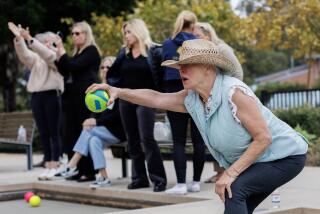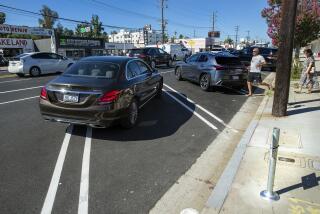Bell Gardens Flush With Poker Taxes, Parked Cars
- Share via
BELL GARDENS — When a poker referendum came before residents for a vote in 1982, the Bicycle Club casino was touted as the conduit for a “bright future” in the city.
Brochures supporting the measure promised $1 million in annual city tax revenues and 600 jobs for local residents.
When city and club officials geared up for the opening of the club one year ago, however, they did not anticipate the phenomenal success of the club--or a parking headache for nearby merchants and residents.
And they certainly did not expect revenues in one year to reach more than $2 million--almost doubling the budget for the Community Services Department--and the creation of more than 1,000 jobs.
But as of September, nearly $2.3 million has been deposited into the city’s coffers from the club, mainly benefiting police and recreation services and the redevelopment of the city. In June, the city adopted a budget of $10.8 million for fiscal 1985-86, which was 21% larger than last year’s budget.
Virtually all the city’s share of funds from the club’s card games have been earmarked for police and recreation, both of which suffered cutbacks in 1978 as a result of tax-cutting Proposition 13.
Seven Positions Added
Salary increases of 7 1/2% and seven positions--two each for a narcotics and gang detail and three for clerical staff--have been added to the Bell Gardens Police Department since 1984, City Manager Claude Booker said. The Community Services Department also gained four new positions and extended night and weekend hours at the city’s two parks.
An increase in criminal activity predicted by some before the poker measure passed never materialized, Police Chief William Donohoe said. He said there have been some problems with club customers blocking driveways, but enforcement for other kinds of problems in and around the club has been minimal. He said he is thankful the department’s previous concerns about a surge in crime “didn’t turn into a horror story.”
The casino has had its downside, though. As the police chief indicated, the main fallout from the club’s success has been parking woes.
Many of the small businesses across the street from the club sought relief from the city in the first six months after it opened because they were losing business. A lack of sufficient parking at the club--which has 750 spaces--has caused patrons to park in front of stores and on residential streets, often for hours at a time.
“There was a lot of spillover into the commercial area, and merchants were hurt really bad,” Booker said.
Many short-term solutions were tried. The club rented a parking lot and ferried employees by bus. This only lasted for four weeks because not enough employees used the service, Booker said. A high-rise casino parking structure was also proposed, but preliminary findings showed it was not feasible because of cost. The club is currently renting two vacant lots on Priory Street for employee parking and has acquired three lots on Hornsey Avenue for future parking.
$32 Parking Tickets
Most merchants, however, say they have been satisfied with the city’s latest stopgap solution. In August, the parking time limit on Eastern Avenue, from Ludell to Clara streets, was changed from two hours to one hour. Also, bail for parking tickets was raised from $14 to $32 and multiple tickets are handed out every time the one-hour time limit expires.
“It cleared up fast,” Booker said. “We rarely give one (a ticket) now.”
The action came as a result of a meeting merchants had with the city’s Traffic and Safety Commission in July. Out of four or five suggestions, the commission found that the one-hour parking limit was the most feasible, chairman Randy Bloomer said. “It’s not a solution . . . but it will help alleviate part of the problem.”
Ray Nitkin, the owner of Plaza Discount Furniture Store, was one of the most vocal merchants lobbying for the city to do something about the parking situation. Although the 60-minute limit has helped, he said, it has created another problem: owners and customers of the small stores are getting stung with tickets.
“That was not the purpose . . . to hurt the people making a living here,” Nitkin said.
What is now being hailed as the solution to the parking problem is a municipal lot on the south side of the club. Booker said the redevelopment agency has targeted that area for its revitalization efforts and is in various stages of negotiations in acquiring nine parcels of land.
Parking for 400 Cars
Four of those parcels on Live Oak Street will be used for a 400-space parking lot that could possibly be leased to the club for employee parking, Booker said.
Eventually, he said, the agency would like to acquire all the property from Eastern Avenue to the Long Beach Freeway, and from Live Oak to Priory Street for redevelopment purposes.
But that plan is based on tax revenues from pai gow, a Chinese tile game, the legality of which is being contested in courts. Booker said the city has funneled all pai gow revenues into redevelopment purposes only so as not to harm ongoing operations should those funds be cut off.
The Bicycle Club has also purchased three parcels in that area to be used for parking, said George Hardie, partner and general manager.
“The only answer is to get additional space and provide additional parking for customers,” Hardie said, adding that the casino has to turn cars away every Friday and Saturday night when crowds are particularly heavy. “It drives me crazy.”
The club has banquet facilities--in addition to a restaurant, beauty salon, gift shop, and two delicatessens--but has not been able to take advantage of the three banquet rooms because there is not enough parking to accommodate patrons. The rental of the banquet facilities is a “tremendous market we’re not able to capitalize on . . . and still service casino customers,” Hardie said.
Listen to Customers
Hardie said there are various reasons why the club has been so successful, including its new facilities and good location (right off the Long Beach Freeway). But, he added, “the main ingredient of success for any of these businesses is management. We pride ourselves on listening to customer complaints.”
The strategy apparently has worked. He said the Bicycle Club has cornered 35% of the market for legalized poker in Los Angeles County and 55% of the market for pai gow. Hardie also estimated the casino’s gross revenues since last November to be $25 million.
“I’m pleased the club is doing well,” said Hardie, who originated the idea for the Bicycle Club. “It’s been a lot of work for me. I work 12 hours a day, sometimes seven days a week. Running this type of business is a constant vigil.”
More to Read
Sign up for Essential California
The most important California stories and recommendations in your inbox every morning.
You may occasionally receive promotional content from the Los Angeles Times.













